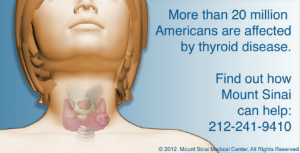 Guest blog written by Deena Adimoolam, MD, Assistant Professor, Department of Medicine, Division of Endocrinology, Diabetes and Bone Disease
Guest blog written by Deena Adimoolam, MD, Assistant Professor, Department of Medicine, Division of Endocrinology, Diabetes and Bone Disease
The thyroid is a butterfly-shaped gland with two sides that sits in front of your windpipe and when it is functioning normally you don’t even know it exists. The main hormone it secretes is thyroxine, which helps to regulate metabolism, growth and development, as well as body temperature. The thyroid gland should not be mistaken for the parathyroid glands, which are completely different entities with separate functions. Since September is Thyroid Cancer Awareness Month, now is a good time to find out if you may be at risk. The first step is to examine your medical history. Have you been previously exposed to radiation treatments for head or neck cancers, nuclear radiation from atomic weapons, or been near a nuclear power plant accident such as Chernobyl or the Fukushima nuclear power plant disaster in Japan, for example? This kind of radiation exposure can increase your thyroid cancer risk. Even ionizing radiation treatments for benign conditions of the head or neck–like acne, for instance, which was a treatment practice that ended thankfully in the 1960s—can increase your risk.
 The next step is to investigate your family history. Do you have a first-degree relative with thyroid cancer or thyroid cancer syndromes such as multiple endocrine neoplasia (MEN), familial adenomatous polyposis, Carney complex, or Werner or Cowden syndromes? If the answer is yes, please make sure to speak to your physician about this.
The next step is to investigate your family history. Do you have a first-degree relative with thyroid cancer or thyroid cancer syndromes such as multiple endocrine neoplasia (MEN), familial adenomatous polyposis, Carney complex, or Werner or Cowden syndromes? If the answer is yes, please make sure to speak to your physician about this.
You may not actually experience any thyroid cancer symptoms such as pain in the neck region, and unfortunately it is not easily diagnosed by blood work. However, it can sometimes be diagnosed during a physical examination. Your doctor will perform a quick neck exam looking for any palpable lumps or bumps called nodules or other irregularities within the thyroid gland. If there is anything of concern upon examination then your doctor will likely order a thyroid ultrasound to look more closely at the structure of your thyroid gland. Should there be anything abnormal on the ultrasound, you will likely need to see an endocrinologist, who specializes in the thyroid gland for further evaluation.
If you think you may be risk or if you are having any thyroid issues, please feel free to make an appointment or email me with any questions.
